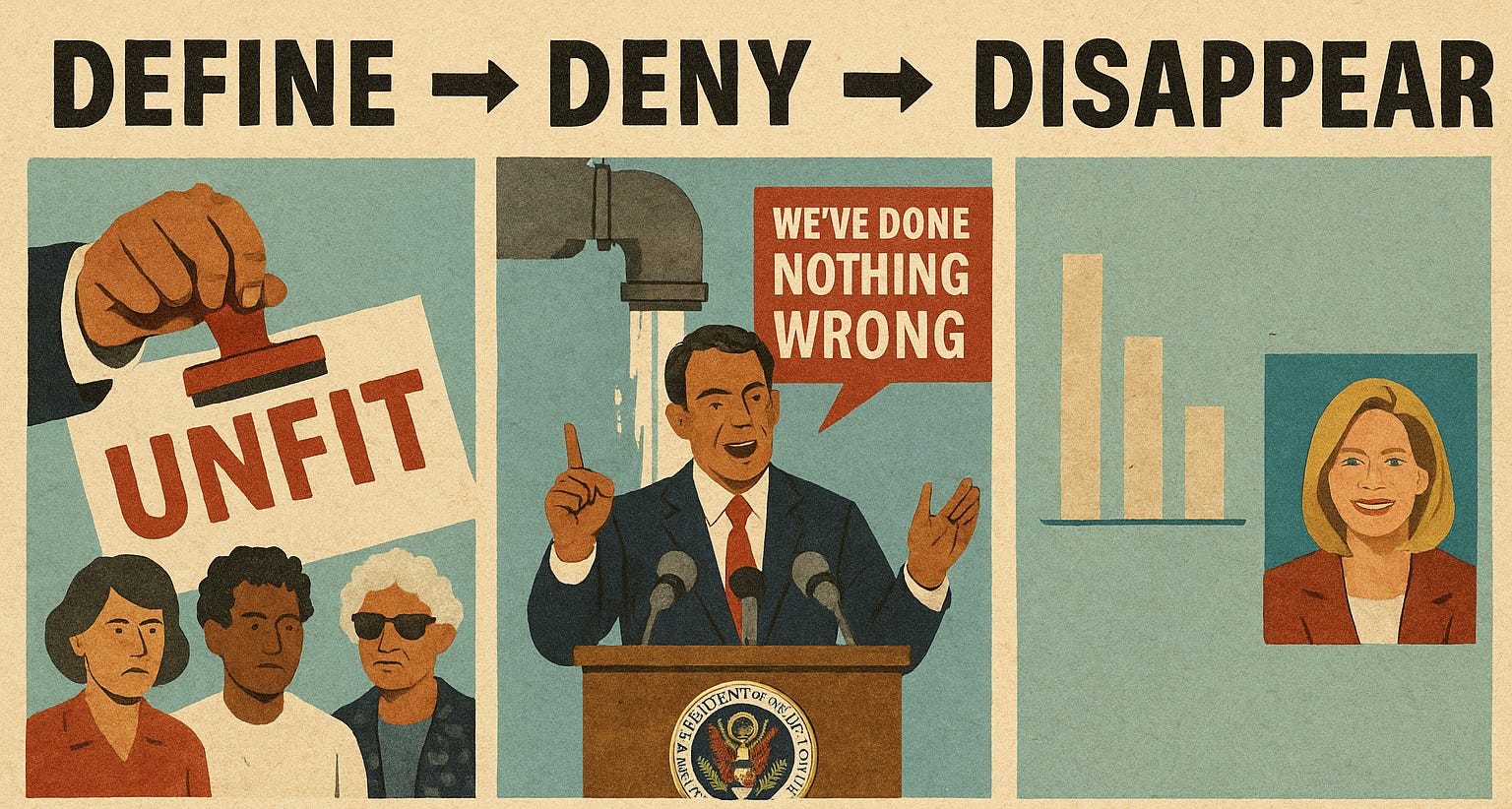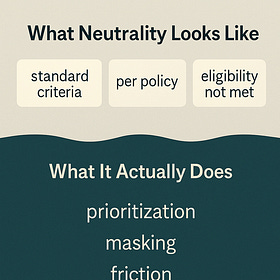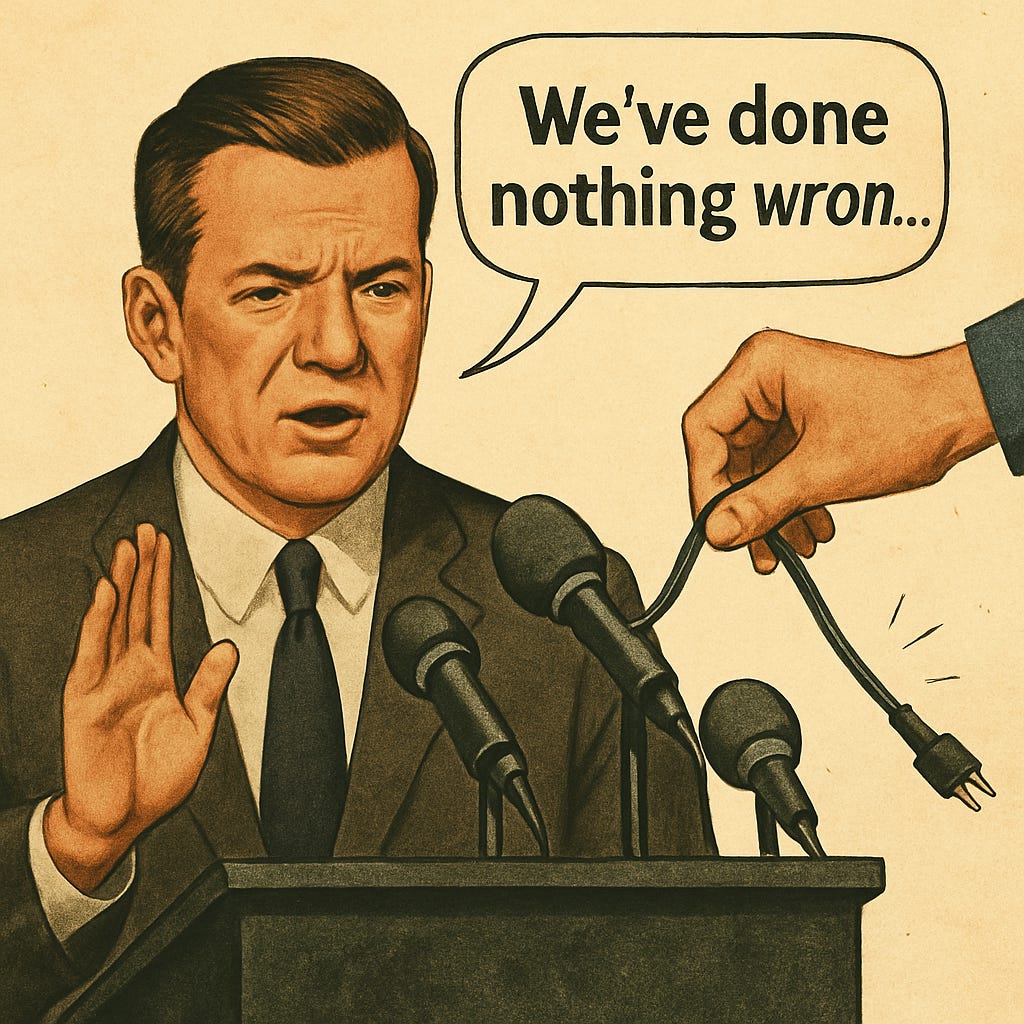Who Gets to Tell the Story?
Why Denial Is the Core of Structural Power
I used to think power was all about coercion—who can push hardest, who can demand obedience. Over time, though, I’ve realized its quietest—and most insidious—weapon is definition.
When a corporation poisons a river and calls the cleanup “routine maintenance,” or when a government purges voter rolls under the guise of “routine verification,” they’re not just dodging blame. They’re asking us to rewrite our own memories.
Narrative control isn’t a sideshow; it’s the foundation. In The Amnesia Engine, I traced how critique gets delayed, absorbed, and erased—so only crisis ever feels real.
Every political battle hinges less on what actually happens than on how we agree to describe it. Label a catastrophic oil spill “routine maintenance,” and public outrage vanishes. Rebrand mass layoffs as “strategic realignments,” and those losing their jobs are told to see opportunity.
When tech platforms funnel extremist content under the banner of “neutral algorithms,” they scale the same empire-building scripts once scribed in manifestos.
Seemingly Neutral Systems
A form doesn’t have to say “no” for a decision to be made. Sometimes the portal just stops updating. The phone call isn’t returned. The phrasing is polite: “based on our standard criteria,” or “you did not meet eligibility requirements.” No one raises their voice. No one explicitly excludes anyone. But someone has been left out.
By shaping our language, institutions train us to doubt our own perceptions—and ultimately to police our own resistance.
This isn’t new. Edward Said’s Orientalism showed how colonial powers depicted entire peoples as irrational or childlike, casting conquest as benevolence. Today’s data infrastructures replay that script at algorithmic speed. Recommendation engines promise “personalization” even as they funnel us toward outrage; surveillance tools hide behind the label “security measures” while denying any distortion of truth. We’ve moved from inked dispatches to policy memos to lines of code—but the logic remains the same:
define the other → deny the harm → justify the control
At the same time, modern governance perfects plausible deniability through procedural opacity. Impersonal forms, automated rejections, and euphemistic jargon shift blame onto “the process.”
A welfare applicant stripped of benefits over a minor paperwork lapse doesn’t face a judgment of unworthiness—they receive a polite notice of “ineligibility”. In boardrooms, environmental collapse slides into annual reports as “externalities,” and mass layoffs morph into “strategic realignments”.
These aren’t cosmetic spins; they’re defensive bulwarks engineered to blunt collective outrage and preempt demands for redress—a pattern I also documented in Actuarial Medicine & Hidden Exclusion.
That denial comes at a human cost. When workers are told that grueling hours amount to “professional development,” they internalize burnout as personal failure. When citizens learn their names vanished from voter rolls through “routine verification,” they begin to doubt whether disenfranchisement happened at all.
This politics of self-doubt fractures solidarity before it even forms—a dynamic I unpacked in Perverse Stability vs. Authentic Peace and The Spectacle of Fraud. By denying structural violence, power not only enforces compliance—it preempts revolt.
Narrative control may be the hidden hand guiding compliance—until we challenge it.
They’ll often insist, “Our systems are too complex to explain fully,” but that complexity usually conceals deliberate design choices: elastic legal terms like “reasonable suspicion,” labyrinthine appeals, and opaque underwriting models. What feels like technical rigor is really a waiver most of us never fully read—surrendering authority over our own boundaries and making resistance seem futile. I laid this out in Emergence Is an Excuse.
We tend to underestimate narrative control for a few reasons:
First, its effects arrive as cumulative micro-shifts—each “voluntary” recall, each “strategic realignment,” each “neutral” fact-check nudges our shared assumptions just enough to slip a new normal into place.
Once institutions set the epistemic floor—defining “national security,” “due process,” or “market efficiency”—the very terms of debate become skewed, making dissent feel like a category error.
Narrative power lives in code: recommendation engines and moderation rules teach us what counts as mainstream long before any headline hits our eyes. And finally, frames carry emotional resonance—calling something “terrorism” instead of “insurgency” doesn’t just rename an event; it triggers fear and shuts down inquiry.
Yet every veneer of denial cracks under epistemic resistance. Dissent means reclaiming the authority to name: whistle-blowers leaking internal memos, source auditors decoding hidden algorithms, survivor networks archiving erased histories.
When we call a river poisoning “pollution,” a layoff “firing,” or a rigged recommendation engine “bias,” we reconnect lived experience to public record—and strip denial of its cloak.
Refusing to repeat the institutional script isn’t just symbolism; it’s the first act of structural change. Each time we name a euphemism, document an omission, or expose a pattern, we loosen denial’s grip on consent.
By insisting on accuracy, solidarity, and truth, we reclaim our most intimate form of power: the authority to define our own reality.






